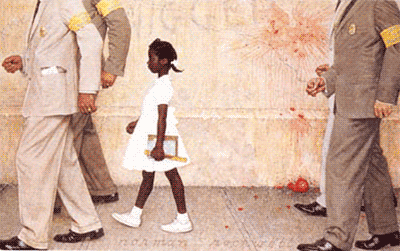This was challenging reading in that it compelled me to learn new vocabulary and concepts, specifically monologicality and dialogicality. (<--That link to Wikipedia helped.) August’s work was eye opening from page one where she sets the scene for her research. Although I heard the phrase before, this was my first detailed introduction to circle time. August describes it as a bridge between home and school offering kids the chance to share - or not - about themselves and their families.
“Children whose discourse patterns match those of the dominant culture, for example, seem to enjoy longer turns and more meaningful interaction with the teacher. And as members of a dominant social structure, children from nuclear family constellations, who see themselves reflected in the explicit and implicit curriculum, add their particular chapters to the written and verbal chronicle of family with little or no fear of social penalty. Their stories are greeted with verbal and nonverbal expressions of understanding and appreciation from their classmates and teacher. Questions from their audience encourage them to expand on their accounts.”
Of course this implies that the opposite is true for children like Cody whose worlds do not reflect dominant culture curriculum. August states, “Differences that make a difference (the particulars vary according to social contest) can lead to otherizing and even exclusion”.
On the surface these circles along with who shares and what and how they share appear innocent. However it scratches the surface of the bigger issue August raises: “discourse has material consequences” because it is this type of social interaction that fuels academic achievement and intellectual development. (I think I will add some version of circle time to my next adult education class.)
Next, on page 167, regarding designed dialogicality, August writes, “The point has been made that all teachers are political agents (Shor, 1992). The political nature of pedagogical philosophy and practice, although always real, is not always apparent.” Here August distills the argument by telling us that the lessons we choose either support and defend dominant causes and interests or they challenge them. Accepting the notion that as an instructor I am a political agent, what do my choice (when I have choice, although Finn would say I always have choice) of curriculum and resources say to the learners? Are my selections dialogical by design as much of Zeke’s were?
Finally, the chapter on dynamic dialogicality offered real-time examples of opportunities for Zeke and his students to create and support a democratic agenda. Specifically the exchange labeled, “Do You Speak Chinese?” presented such a teachable moment after Shiloh impersonated a Chinese speaker. During the group exchange an unnamed child told the others that making fun of a different language could hurt someone’s feelings. Zeke confirms that it is not okay to hurt feelings. He goes beyond the obvious by illuminating the bigger issue: it is not okay to make fun of any language or any difference.
Therefore this final quote, from page 153 of chapter five, informs the reader of what Zeke was attempting to impart to his students. August acknowledges Zeke’s choice to focus five and six year-olds on the heart of the matter. She crystallizes this for me saying,
“The ethical principle that underlies such reasoning is inadequate, equivalent to that which forgives the telling of racist jokes when a person of color is not present. Such expressions of dominant ideology, regardless of whether offense is taken, widen the paths of least resistance (Johnson, 2006). This is the stuff of which privilege is made. It is also the stuff of which oppression, privilege’s necessary counterpart, is made.”
Finally, whether or not all or any of the children understood the bigger issue is unknown to the reader. Zeke pointed out the difference and planted the seed in their minds. He made the most of an opportunity by challenging a student’s and her classmates’ assumptions about difference and what is funny on a deeper level than many adults dare to consider.
Sunday, June 20, 2010
Subscribe to:
Post Comments (Atom)

I visited the Wikipedia link you posted. It does help to explain the concept. The past influences what we say and our words influence the future. As August states,"The speaker/writer does not create an utterance unaided or unfettered by what has been previously published(in the most general sense), neither does she create an utterance without consideration of how it might be received by those who hear or read her comment>"
ReplyDelete